Trustees’ Annual
and Financial Statements for the year ending 31 July 2024


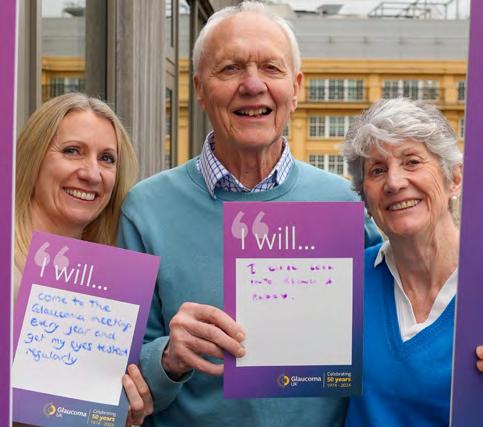








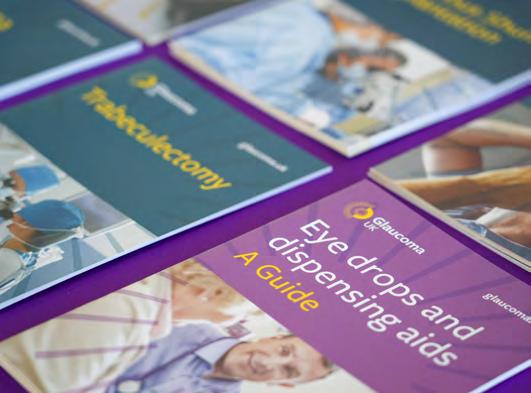


Trustees’ Annual
and Financial Statements for the year ending 31 July 2024















I’m delighted to be sharing our Trustees’ Annual Report for 2023-24 with you. It has certainly been a memorable 12 months as we have celebrated our 50th anniversary.
I feel very fortunate to be the incumbent Chair as Glaucoma UK reaches this highly significant milestone, and I want to take a moment to extend my thanks to all those who have preceded me. The charity, as it stands today, owes a debt of gratitude to the commitment and vision of the previous chairpersons, trustees and staff members who worked so hard to improve the lives of people living with glaucoma.
Principal actor among that cast is, of course, our founder Ronald Pitts-Crick, who established the charity in 1974 and dedicated 30 years of his life to leading its work. Although much has changed since that time – including the charity’s name - the passion to bring an end to preventable sight loss from glaucoma remains unabated.
To honour our founder in this anniversary year, it has been a great pleasure to introduce the new Pitts-Crick Research Fellowship. This initiative offers an excellent opportunity to support an ambitious researcher over three years as they work to further our understanding of the disease.
Another key feature of our anniversary celebrations has been a deepened focus on what it means to be a member of Glaucoma UK. The team have been working harder than ever to ensure that our members feel part of a dynamic and mutually supportive community. We hope everyone who enjoyed our regular Insight magazine, called our helpline, attended our webinars or lectures, took part in a support group, received training or sought advice from one of our Buddy volunteers will agree that we achieved that goal.
The country has seen considerable change during the year, with a new government and an ever more varied range of diagnostic and treatment options for glaucoma patients to navigate. Against that backdrop, it’s essential that we offer continuity, advocacy and trusted advice for our members and supporters. So, as we enter our second half-century, we will continue working to raise awareness, provide support, fund sight-saving research and influence glaucoma policy and practice.
As we tackle this ambitious ‘To Do’ list, we will be mindful that none of it would be possible without the extraordinary people who fundraise for our charity and those who make voluntary gifts to support our essential work. Your generosity and kindness underpin every achievement you will read about in this report. As such, it is dedicated to you, with our heartfelt thanks.
Professor Anthony King, Consultant Ophthalmologist and Glaucoma UK Chair
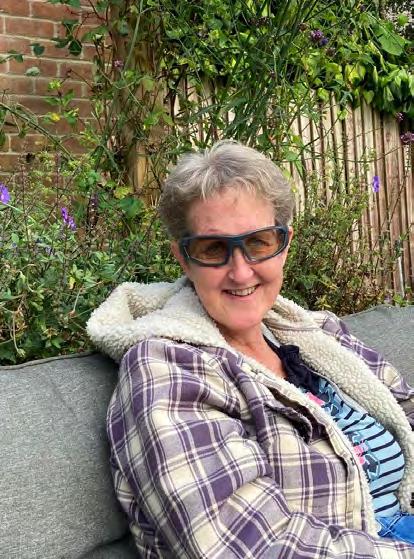
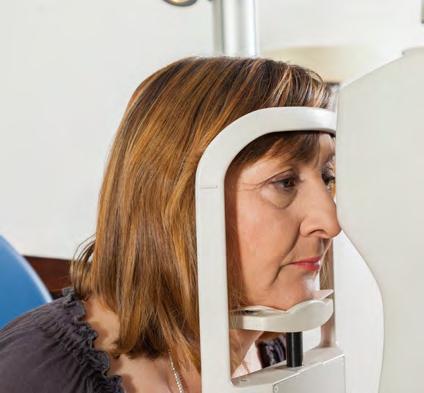
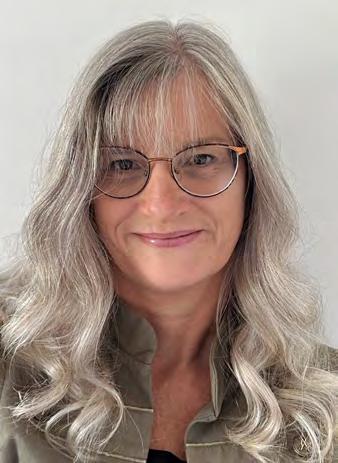

I echo the Chair’s comments about what a privilege it is to find oneself at the helm during Glaucoma UK’s special anniversary year. It is also a huge responsibility.
While it is a joy to look back on 50 years of progress, we are keenly aware that we must achieve even more in the future. We must make more people aware of the risk of glaucoma; we must provide even more support in more accessible ways to more people; we must spend more on sight saving research. And –most importantly of all – we must share the voice of our members even more loudly with those responsible for developing and delivering glaucoma care.
To make all this happen, we are excited to be embarking on a period of growth. As this report highlights, we have already begun to reap the benefits of a new Head of Research, additional helpline resource and a new team of Training and Engagement Officers who took up permanent roles in all four nations of the UK during the year.
Among those benefits was our highest ever number of helpline enquiries, the best-attended UK and Eire Glaucoma Society (UKEGS) Conference in the event’s history, the highest ever attendance at our online webinars, the introduction of a new research fellowship and just under 1 million instances of support for people living with glaucoma.
We have made a promising start to our ambitious three-year financial plan, which will see us seeking new income streams and drawing on our reserves to maximise the reach and impact of our vital sight saving work. Our progress to date is thanks to the wise counsel of our Board of Trustees and the hard work and dedication of my extraordinary colleagues; I hope you enjoy reading about their achievements in this report.
Joanne Creighton, Chief Executive Officer
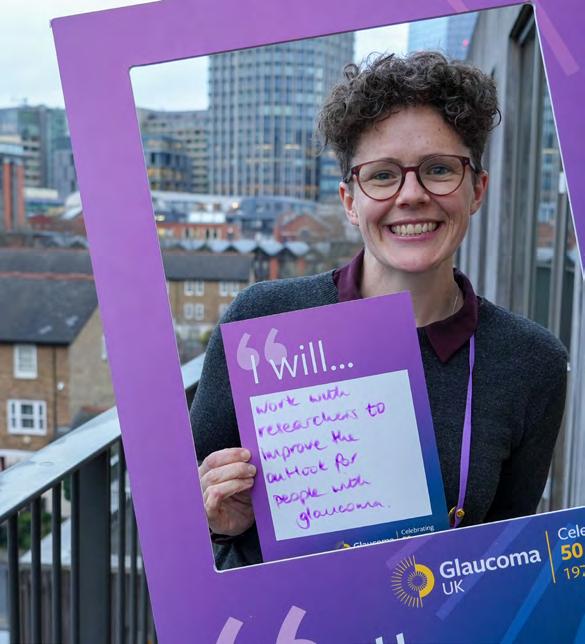
“ We are excited to be embarking on a period of growth
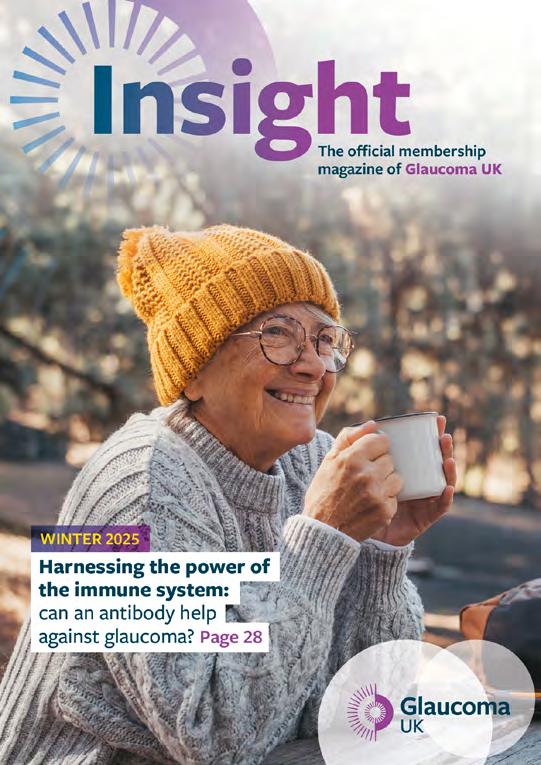

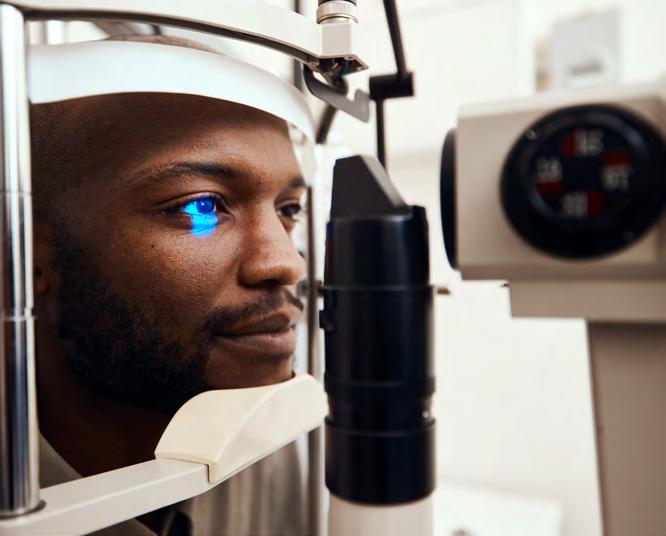
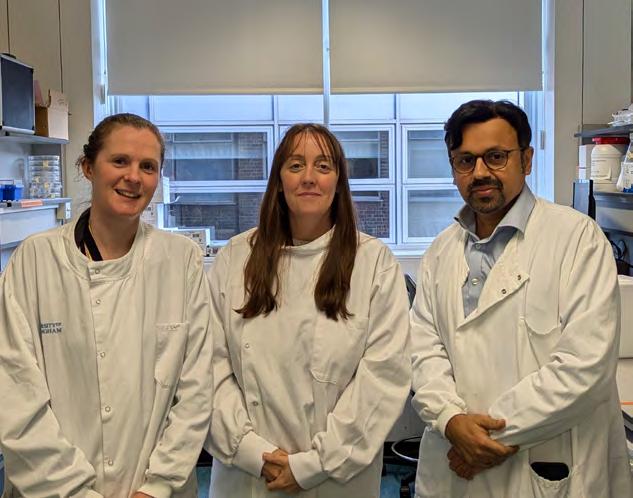
Glaucoma is a complex group of eye diseases that damage the optic nerve and, if left untreated, can lead to irreversible vision loss and even blindness.
At Glaucoma UK, our goal is to eliminate preventable glaucoma-related sight loss. Currently, we believe that well over 700,000 people in the UK are affected by glaucoma, yet nearly half are unaware of it due to the frequent lack of early symptoms.
The only reliable way to detect glaucoma is through a comprehensive eye examination, but more than a third of UK adults don’t attend regular check-ups.
The issue is even more pressing in high-risk groups, including individuals facing socio-economic challenges and those of African-Caribbean descent, where attendance rates are even lower. Therefore, we are dedicated to raising awareness about the importance of early diagnosis across all communities. Alongside early detection, timely treatment and ongoing monitoring are also essential in helping people with glaucoma preserve their vision for life. However, with rising demand and lengthy wait times, much remains to be done to establish a reliable and consistent treatment pathway across the UK. We strive to amplify the voices of those living with glaucoma, so they are heard by healthcare providers, policymakers, and service commissioners.
Perhaps our greatest tool in preventing sight loss from glaucoma is research. We aim to understand the causes of glaucoma, how to prevent it, which treatments are most effective, and—ultimately—how to cure it. Through our annual funding program, we support research that explores new medical and surgical approaches and innovative treatment models in the hope of finding these answers.
Our Theory of Change sets out the long-term, sustained impact we want our work to have for people living with glaucoma. As a result of our efforts, we want to change the glaucoma care landscape in the following ways:
1 Increased awareness and earlier diagnosis of glaucoma among those who are most at risk.
2 More people are able to live well and maintain sight through equitable and timely access to effective clinical care and pastoral support. We focus on four priority areas in pursuit of these sustained impact goals:
• Disseminating clear, accessible, impactful messaging about the risk to individuals.
• Ensuring professionals are aware of Glaucoma UK’s role in supporting glaucoma care.
• Giving accessible and effective advice and information to individuals and their carers.
• Offering practical and emotional support to help individuals adhere to their treatment regime.
• Creating and promoting an active and mutually supportive glaucoma community.
• Providing funding for high-quality research into glaucoma prevention, diagnosis, treatment and cure.
• Liaising with corporate bodies to improve glaucoma treatments and patient outcomes.
• Advocating for the patient perspective in the design, development and delivery of glaucoma care pathways.
• Providing relevant and credible information and support for medical professionals.
The first step in bringing about an end to glaucoma sight loss is to raise awareness about the disease and the risk to individuals. Our awareness raising campaigns encourage people to have their eyes examined every two years, unless advised otherwise by their healthcare professional.
We also want to ensure that people know about our work and the many services we provide to help them manage their glaucoma.
We work to raise awareness among eyecare professionals, too. They have an essential role to play in signposting their patients to our charity, so that we can provide the pastoral support that simply cannot happen in the time-strapped clinic environment.
Desired outcomes of our efforts to raise awareness include:
» More people understand why they may be at risk of glaucoma and that it could impact their vision, even without symptoms.
» More people who are at highest risk of glaucoma seek an eye examination.
» More professionals are aware of Glaucoma UK and refer people to us for advice and support.
The progress we made during the year
Our National Eye Health Week Campaign in September delivered essential bitesized information via seven short videos, designed to be easily shared on social media.
In November, we shared our Road Safety Week message via social media and adverts on petrol nozzles in cities with a lower uptake of eye tests. A range of eye sector publications also featured the campaign.
For Father’s Day in June, we ran a digital billboard campaign to highlight the hereditary nature of glaucoma, alongside a social media advertising campaign.
During Glaucoma Awareness Week in June, we invited people to share their family stories to help raise awareness of glaucoma in families, encourage people to talk about their eye health history and highlight the importance of regular eye tests.
An epic challenge by one of our members to run from Land’s End to John o’ Groats in June this year helped to raise awareness of glaucoma across the UK.
The impact on people with living with, or at risk of, glaucoma
Over 1.1 million people reached on social media and an estimated 1.5 million readers via an article in The Guardian newspaper.
Our social media posts were seen 14,297 times and an estimated 432,000 people saw the petrol nozzle ads.
The billboards were seen by an estimated 39 million people across the UK, with a further 242,219 people reached via social media.
The campaign secured over 21 hours of airtime across a wide network of radio stations and reached 321,742 social media users.
Over 27 million people reached via regional and national press coverage and 438 items of radio coverage secured.
The progress we made during the year
Our Ramadan Campaign, in partnership with the British Islamic Medical Association and the Muslim Council of Britain, was featured in print media, on the regional news network and on posters in opticians’ practices throughout the UK.
Via 27 talks to community groups and other charities across the UK, we helped to raise awareness of glaucoma amongst groups at highest risk.
We ran targeted social media advertising campaigns throughout the year for communities known to be at a greater risk of glaucoma. These included people of African-Caribbean and East Asian ethnicity, the over 60s and those experiencing social deprivation.
The impact on people with living with, or at risk of, glaucoma
Individuals received our message via the British Muslim Magazine (45,000 readers) and the magazine’s website (74,000 monthly views).




Sessions attended by 460 individuals from varied backgrounds and ethnicities.
A total of 1,097 searches for free NHS eye tests were made on our website by those who viewed the advertisements.
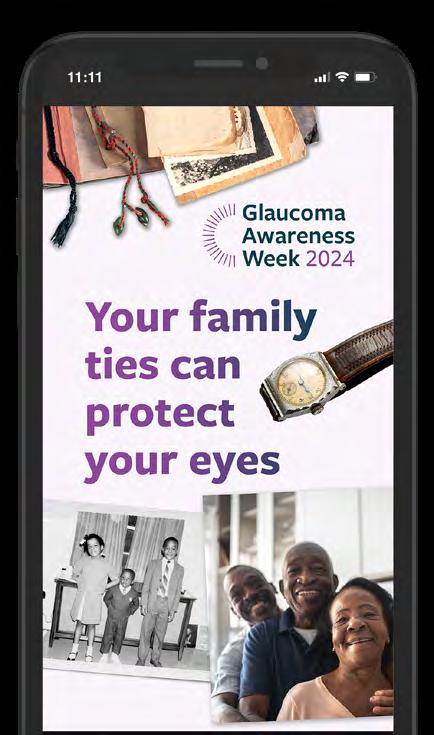
The progress we made during the year
Glaucoma UK was invited to present at the Glaucoma Risk Prediction event at City University in November 2023 and the Moorfields International Glaucoma Symposium (MIGS) in January 2024.
Our Training and Engagement Officers delivered 15 presentations to professionals during the year to raise awareness of the charity, detail the services we provide and encourage patient referrals.
The impact on people with living with, or at risk of, glaucoma
Patient-focused advocacy with over 300 glaucoma professionals.
Over 200 professionals in attendance from social care, occupational therapy, sensory support, vision rehabilitation, optometry and pharmacy.
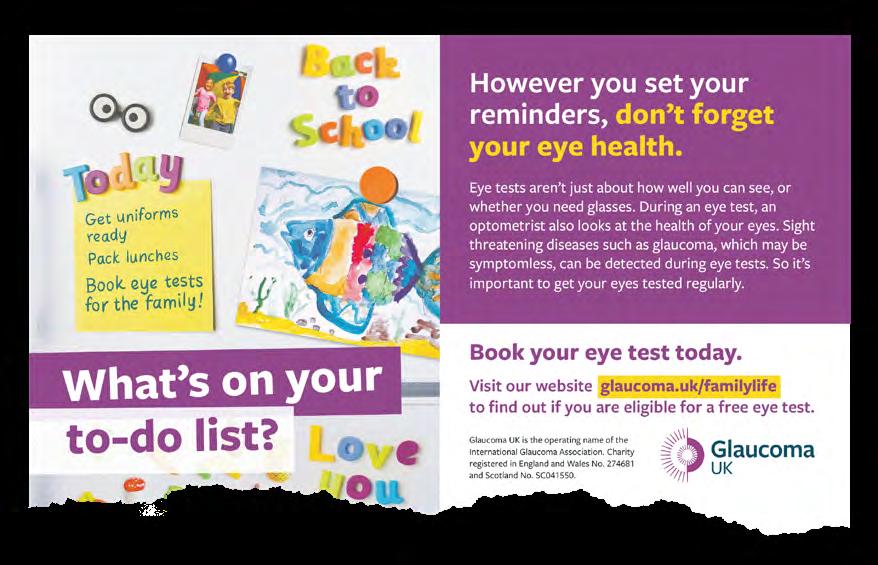
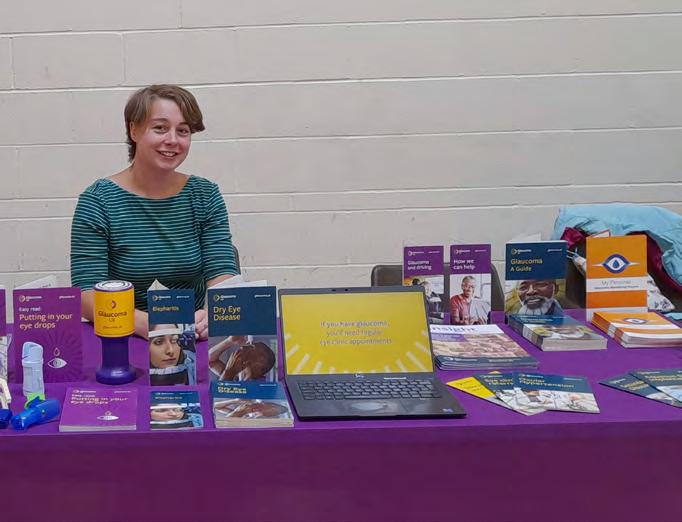
Supporting people with glaucoma and their loved ones is a vital element of our work. Glaucoma treatment can be complex and challenging, with some individuals finding the treatment worse than the early effects of the disease itself.
Understanding glaucoma and its allied conditions and making choices about the many different treatment options can be overwhelming. With clinic appointments generally infrequent and brief, it is hard for individuals to have the time and space they need to ask questions and fully digest the replies.
At Glaucoma UK, we want to empower people by offering the right help and advice, delivered in the right way, at the right time. We want to be at the heart of a vibrant, supportive glaucoma community, where people can share their experiences with others facing the same challenges and choices.
Our various services provided just under 1 million instances of support, information and guidance during the year.
Desired outcomes of our support services include:
» More people understand their condition and feel able to adhere to their treatment regime.
» More people at increased risk of sight loss are able to access support from Glaucoma UK when and how they need it.
» People feel more confident and positive about their condition by being part of a supportive glaucoma community.
The progress we made during the year
Our interactive Digital Glaucoma Support Groups, featuring expert guest speakers, covered topics including ‘What do you want to know about glaucoma?’ ‘Vitamin B3 research’, ‘Preserflo and trabeculectomy’, ‘Glaucoma and cataracts’ ‘Glaucoma jargon busting’, ‘All about glaucoma’, ‘Eye drops’, and ‘Dry eye’.
PIF TICK accreditation was achieved during the year, confirming the charity’s status as a trusted information creator.
The PIF TICK is the UK’s only assessed quality mark for health information.
In August 2023 we launched a new, more accessible, version of our popular booklet ‘Driving and glaucoma’, with updated information covering all four nations of the UK.
The impact on people with living with, or at risk of, glaucoma
Over 800 people joined the live sessions, with a further 25,199 accessing the recordings on demand. 99% of survey respondents said they would recommend the sessions and 72% gained a better understanding of the disease.
PIF TICK accreditation helped to ensure that the information we provided was evidence-based, understandable, jargonfree and up to date.
Over 9,500 copies of the new booklet have since been distributed to individuals and healthcare settings.
The progress we made during the year
The recruitment of an additional helpline advisor increased our capacity to respond to calls and emails. Once again, the most popular topics were eye drops, driving with glaucoma, advice about surgery and support with appointments.
Our HealthUnlocked forum continued to be a popular resource for those who prefer to take part in online discussions at a time convenient to them.
By hosting 26 face-to-face support groups, we enabled glaucoma patients to meet others, ask questions of professionals and learn more about the help we provide.
The impact on people with living with, or at risk of, glaucoma
A total of 3,544 calls and emails were answered, representing over 560 hours of support. This was a 30% increase on the previous year and our highest annual total to date.
Over 4,000 posts and responses were shared, and 759 new members were welcomed to the community.
A total of 350 individuals received inperson support at our support groups.
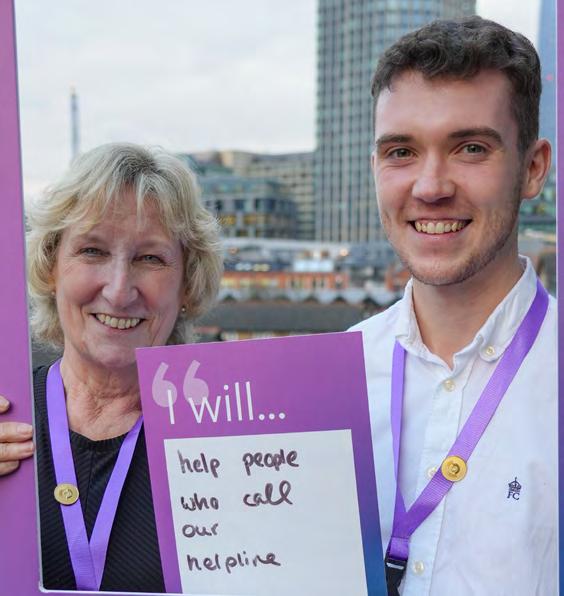
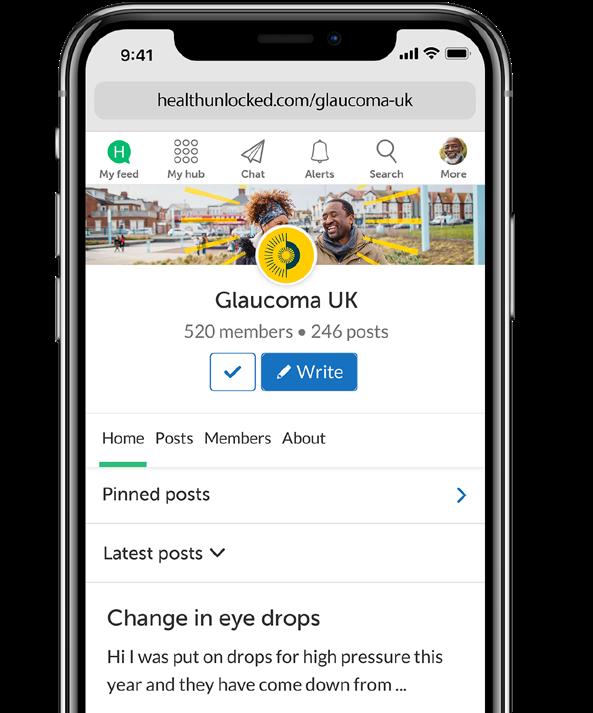
The progress we made during the year
Our volunteer Buddy Scheme continued to be a source of invaluable peer-to-peer support for those considering glaucoma surgery. The introduction of virtual Buddy Coffee Mornings provided a welcome opportunity to more regularly thank our Buddies and discuss the successes and challenges of this vital volunteer role.
Case study volunteers shared their experiences of living with glaucoma via radio and TV interviews, podcast recordings, billboard campaigns and media interviews. Case study stories were also featured in every edition of our Insight magazine.
Growing our Glaucoma UK community has been a key priority for our 50th anniversary. In addition to further improving our member communications, we introduced a new ‘Welcome webinar’ in July, featuring key facts and statistics about glaucoma and information about the services we provide.
Sign-ups for our ‘Focus’ e-newsletter, grew significantly during 2023-24, driven largely by successful, targeted social media campaigns, helping us reach and engage a broader audience.
The impact on people with living with, or at risk of, glaucoma
Over 60 buddy pairings were facilitated during the year and 44 new buddies agreed to join the scheme, bringing our total of buddy volunteers to 82.
Our community of over 90 case study volunteers helped us by sharing stories that were featured in all our major awareness raising campaigns during the year.
We welcomed 638 new members to our 4,849 strong community of glaucoma patients and professionals.
The Focus audience more than doubled during the year, with a total of 5,398 subscribers by July 2024.
progress we made during the year
We ran our first Digital Glaucoma Support Group led by glaucoma patients during the year. The session entitled, ‘Lived experience of eye drops’, featured speakers recruited via our online HealthUnlocked forum.
A special-edition membership magazine called ‘Inspire’ showcased the inspirational fundraising efforts of our members and publicised a new campaign called ‘I will…”, inviting pledges of support for people living with glaucoma.
For World Glaucoma Week in March, we ran a series of webinars showcasing glaucoma care in different parts of the world and revealing how research findings are shared across the globe.
The annual Excellence in Glaucoma Care Award, which is presented at our Annual General Meeting, celebrates individuals or teams making remarkable contributions to the field of glaucoma care.
Over 20 people attended, with 85% stating that their knowledge of glaucoma increased and 99% willing to recommend the session to others.
From urging family members to have an eye test, through to running a marathon, responses to our ‘I Will…’ campaign highlighted the loyalty and dedication of the Glaucoma UK community.
A total of 30 attendees enjoyed our ‘Glaucoma care everywhere’ series.
The winner for 2023-24 was Zainab Alrikabi, a PhD student at Glasgow Caledonian University, who gave firstclass care to participants in her research study.
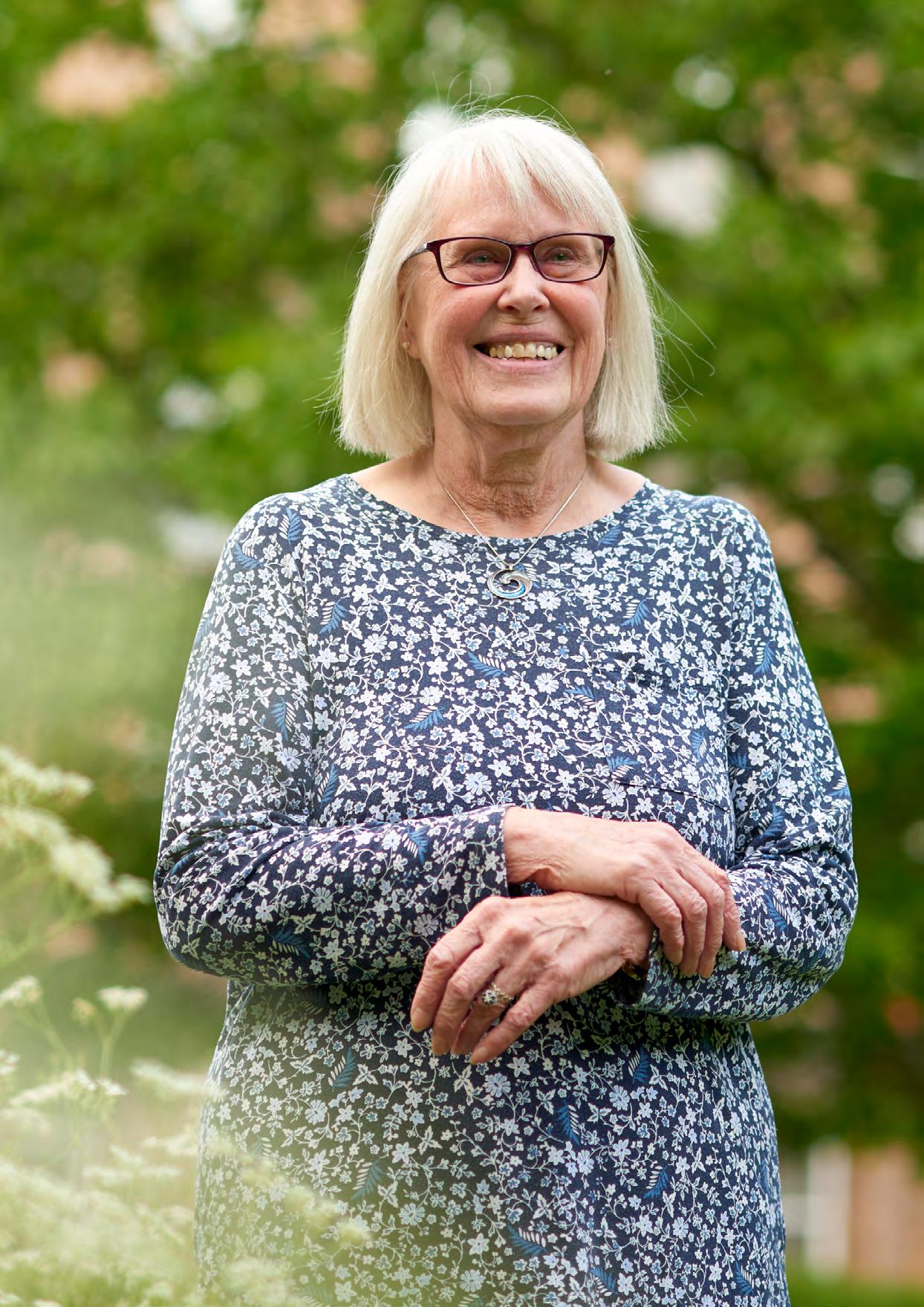
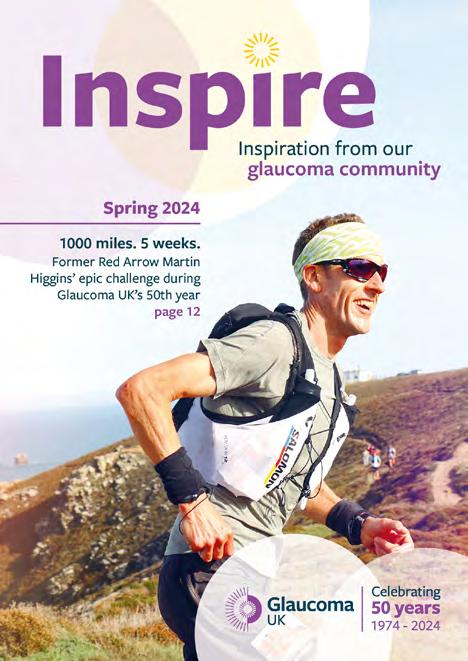
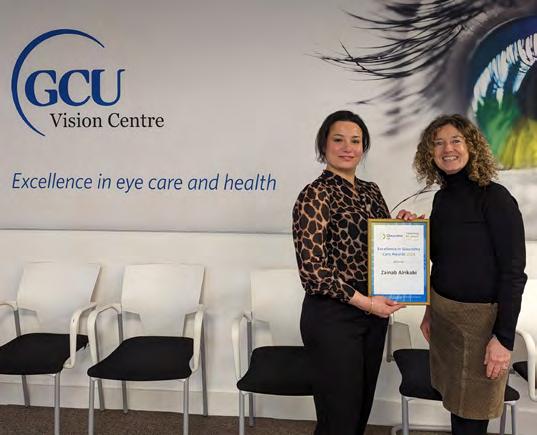
As the only UK charity solely funding research into glaucoma, our work to support the most promising studies, led by the most talented researchers, is a key aspect of our mission.
In addition to our annual awards for ophthalmologists, health and social care professionals and members of the UK and Éire Glaucoma Society (UKEGS), we also offer an ‘Open Call’ programme to attract novel research into new methods of diagnosis, care and treatment.
By helping to fund the Professor of Ophthalmology at University College London and working with partners including the Royal College of Ophthalmologists, we aim to deliver an ambitious research programme that will have a real impact for the people we serve - now and in the future.
In 2023-24, we awarded new grants to the value of £412,711 (but with one of £49,489 to be accounted for in next year’s accounts, due to a contract delay at the financial year-end). The grants were awarded in open competition by an awards panel chaired by a Glaucoma UK trustee. Other panel members were drawn from our Clinical Advisory Panel and our lay member volunteers. All awards were subject to a peer review process.
Desired outcomes of our research programme include:
» More of our research projects demonstrably transform glaucoma prevention, diagnosis and treatment.
» Research we fund is more widely disseminated to inform and improve glaucoma care.
» We achieve more leverage from our research support and sector relationships.
The progress we made during the year
We launched the brand-new PittsCrick Career Development Research Fellowship in March, in recognition of the charity’s 50th anniversary. Through this three-year programme, we hope to support a rising star in glaucoma research who will go on to play a pivotal role in transforming glaucoma care.
The £50,000 UKEGS research grant for 2023 was awarded to Patrick Gunn, Lead Optometrist at the Manchester Royal Eye Hospital, for his project entitled ‘Minimising the implementation gap in management of narrow angle glaucoma suspects through education and technology’. The project commenced in December 2023 and will run for two years.
We were delighted to award two grants for this year’s joint award with the Royal College of Ophthalmologists:
Dr Lisa Hill, Associate Professor at the University of Birmingham, was awarded just under £100,000 for her project to explore whether a new anti-scarring treatment can be delivered to the eye to improve drainage through the trabecular meshwork.
The impact on people with living with, or at risk of, glaucoma
Promising applications have been received from individuals across a range of specialisms including ophthalmology, optometry and research science. The Fellowship will be awarded in early 2025.
By supporting optometrists to manage low-risk patients more effectively in community settings, the project seeks to reduce unnecessary hospital referrals, free up time for more complex cases and reduce treatment delays.
Both projects will explore innovative, novel therapies for glaucoma, particularly focussing on the causes of poor drainage of fluid from the eye.
The studies offer real potential for the discovery of an alternative to pressurelowering eye drops.
Dr Victoria McGilligan at Ulster University was also awarded just under £100,000 for her investigation into an antibody which can harness the body’s natural immune system and reduce inflammation in the drainage channels of the eye.
The £50,000 Health and Social Care Professionals’ grant for 2023 was awarded to Matt Roney at Liverpool Hospital Foundation Trust and the University of Liverpool. The project will investigate whether OCT can be used to identify early signs of surgical failure after surgery.
Glaucoma UK is now an introductory member of the Association of Medical Research Charities (AMRC). We are reviewing and improving our processes and procedures in order to achieve full membership status within the next two years.
(See previous page)
Earlier intervention after surgery could mean more successful surgeries, with fewer complications and - ultimately – the reduction of sight loss due to glaucoma in the longer term.
By becoming an AMRC member we will benefit from opportunities to connect and collaborate with other research organisations and receive support to fund the best and most impactful research.
In partnership with University College London and the Moorfields Biomedical Research Centre, the charity provided continued financial support for the role of the Glaucoma UK Chair of Ophthalmology for Glaucoma and Allied Studies – Professor David (Ted) GarwayHeath.
Professor Garway-Heath’s achievements for the year included:
• 9 new scientific publications
• 18 national and international lectures for a range of organisations including the Irish College of Ophthalmology (Mooney Lecture), European Glaucoma Society, Italian Glaucoma Society, Imaging and Perimetry Society and the Moorfields International Glaucoma Symposium.
• Provision of strategic input and guidance for the European Glaucoma Society (EGS) as member of the Executive Committee and immediate Past President
• Furtherance of the EGS patient advocacy project, including the first patient-initiated and organised plenary session at the European Glaucoma Society Congress in Dublin.
• Chief Investigator for the research projects:
» ‘The association between mitochondrial function and glaucoma–identifying susceptible patients’;
» ‘Identifying the genetic basis for heritable normal tension glaucoma, with a focus on mitochondrial function’ and,
» ‘NicotinAMide in Glaucoma (NAMinG): A randomised, placebo-controlled, multi-centre, Phase III trial’ to test the effectiveness of vitamin B3 as a treatment for glaucoma.
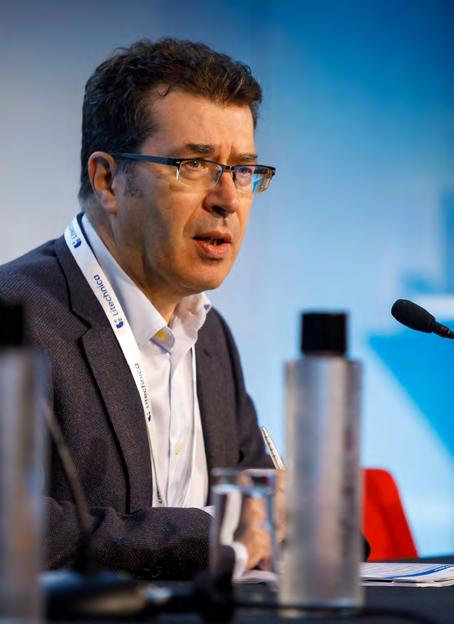
The progress we made during the year
Research jointly funded by Glaucoma UK and the UK & Eire Glaucoma Society (UKEGS) was published in the prestigious Nature Medicine magazine in June 2024.
The project, which identified a new biomarker for glaucoma progression, was carried out by Bledi Petriti and Professor Garway-Heath, the Glaucoma UK Professor of Ophthalmology.
Following publication of the article, Ted Garway-Heath was also interviewed on BBC Radio 4’s ‘In Touch’ programme.
Other projects we have funded have resulted in presentations at conferences such as the world-leading ARVO (the Association for Research and Vision in Ophthalmology) and UKEGS, as well as publications in journals including Cells and PLOS One.
A new UK Clinical Eye Research Strategy, featuring consultation feedback from Glaucoma UK members, was featured on BBC Radio 4’s In Touch programme in July. The strategy sets out new priorities for all aspects of eye research, but glaucoma was the topic receiving the highest consultation response.
The impact on people with living with, or at risk of, glaucoma
Nature Medicine has one of the highest impact factors of any journal (the measure of how frequently the articles have been cited in a particular year).
The research findings will help to identify patients at risk of faster progression, informing personalised treatment strategies and targeted therapies.
Ensuring that the outcomes of our research funding are widely shared among glaucoma professionals will help improve the prospects for prevention and cure.
The strategy will help channel precious resource in eye research towards the most important topics. It will encourage government, charity and industry funding into these areas.
The progress we made during the year
Glaucoma UK continued to be an active member of the Vision Impairment Charity Sector Partnership (VICSP), which was rebranded as the ‘Vision Partnership’ during the year. This partnership of eight organisations, including RNIB and Guide Dogs UK, seeks to achieve alignment and added value for people living with – or at risk of – sight loss.
A new strategic direction was set out for the group in January, aligning closely with Glaucoma UK’s Theory of Change.
Glaucoma UK’s Head of Research led a workshop for charity partners in June, exploring ways to increase research funding and get more patients involved in ground-breaking eye research.
We became an affiliate charity of ‘Our Future Health’ during the year - a charitable health research project seeking 5 million volunteers to share their health data and thereby help develop new ways to prevent, detect and treat diseases.
The impact on people with living with, or at risk of, glaucoma
Involvement in the partnership offers the combined resources and collective influence of all key organisations in the sight sector.
Priorities for the next three years include:
• Influencing national policy.
• Improving access to services for underserved communities.
• Advocating for more medical research funding.
Over 20 representatives from eight sight sector organisations shared ideas and identified joint working opportunities.
Involvement in the project will enable us to learn from their expertise in reaching high-risk populations and securing engagement in health research.
The progress we made during the year
Glaucoma UK is taking part in a thought-leadership project, led by the pharmaceutical company Santen, to explore future trends in glaucoma diagnosis, treatment and management. Following research with glaucoma patients and professionals, a series of studies will be produced, focusing on artificial intelligence, genomics and biomarkers, service delivery, innovative treatments, health equity and patient education.
In January, Glaucoma UK announced a one-year partnership with the care plan provider OcuPlan to improve awareness of eyecare options for glaucoma patients. The collaboration is a joint effort to enhance awareness and support for individuals living with the disease.
As well as working together to improve understanding of glaucoma more generally, the partnership will also promote patient choice and informed decision-making about eyecare options.
impact on people with living with, or at
With an overarching theme of ‘the glaucoma patient of the future’, Glaucoma UK will be well placed to ensure that the interests of its beneficiaries are at the heart of this important piece of work.
Just under 100 people attended a Digital Glaucoma Support Group led by OcuPlan’s CEO, and 14 Glaucoma UK members took part in a consultation to help OcuPlan understand the challenges faced by glaucoma patients.
In support of the partnership, OcuPlan contributed £50,000 towards the delivery of Glaucoma UK’s free support services.
The progress we made during the year
Our relationship with Specsavers continues to offer a valuable opportunity to showcase the work of Glaucoma UK and amplify our messaging.
Chairman Anthony King was a guest speaker at the Specsavers’ Professional Advancement Conference in September 2023 and also the 100% Optical event in London’s Excel in February 2024.
Joint messaging was agreed for World Glaucoma Week and Glaucoma Awareness Week. For the latter, Specsavers worked with artist Louisa Schmolke to create a piece of art that reflected the effects of glaucoma on eyesight. The artwork was kindly gifted to Glaucoma UK.
The impact on people with living with, or at risk of, glaucoma
All joint awareness raising in partnership with the UK’s biggest high street optometry chain offered a valuable opportunity to highlight Glaucoma UK’s key messages and showcase the ways in which those working in community optometry can help deliver our charitable objectives.

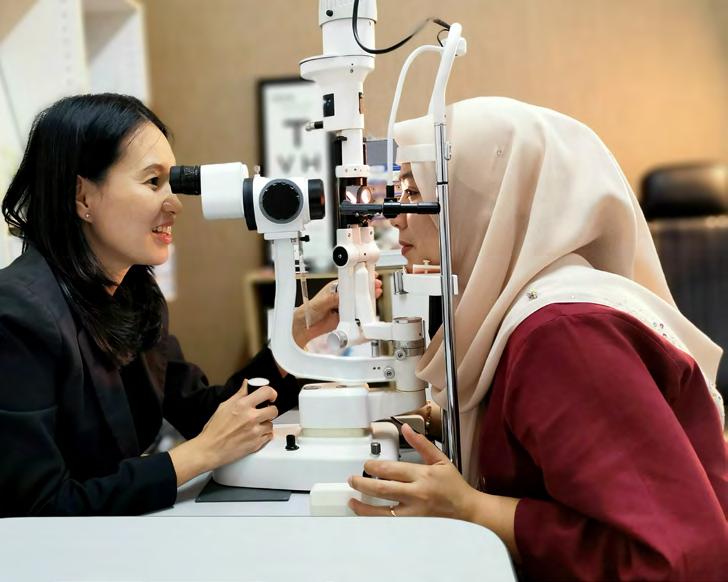
With the eyecare landscape changing at such a rapid pace, we must ensure that the voice of people living with glaucoma is heard by policy makers and those making decisions about care services. We also feel we have an important role to play in providing information, advice and support to health care professionals.
We want all those involved in delivering glaucoma care to have up-to-date information and access to effective professional networks for sharing best practice. Through the work of our Professional Engagement Team, we seek to make connections that can help to promote, protect and safeguard the interests of people living with - or at risk of - glaucoma.
Through our administration and support for the United Kingdom and Éire Glaucoma Society (UKEGS) – which became part of Glaucoma UK in 2019 – we play a key role in bringing together scientists and clinicians in a vibrant, aspirational scientific community.
Desired outcomes of our professional engagement work include:
» More people at increased risk of glaucoma have equitable access to eyecare services.
» Those making decisions on policy and commissioning take greater account of glaucoma patient perspectives.
» More people at increased risk receive timely access to eyecare services.
» More professionals feel better informed and equipped to support people to live well with glaucoma.
The progress we made during the year
A Westminster Hall debate took place in April, focusing on the current state of glaucoma care. Glaucoma UK was referenced by the shadow minister for health, along with our message about the importance of regular eye tests.
In April, Glaucoma UK was represented at an All-Party Parliamentary Group (APPG) open meeting about innovation in Eye Health. Discussion topics included AI assisted diagnostic hubs and community monitoring.
The impact on people with living with, or at risk of, glaucoma
Subsequent requests for media comment allowed us to highlight the benefits of a National Strategy for Eye Care to ensure equality for glaucoma patients across the UK.
Glaucoma UK supported the call for better connectivity between primary and secondary eyecare and the need for more consistency in provision across the UK.

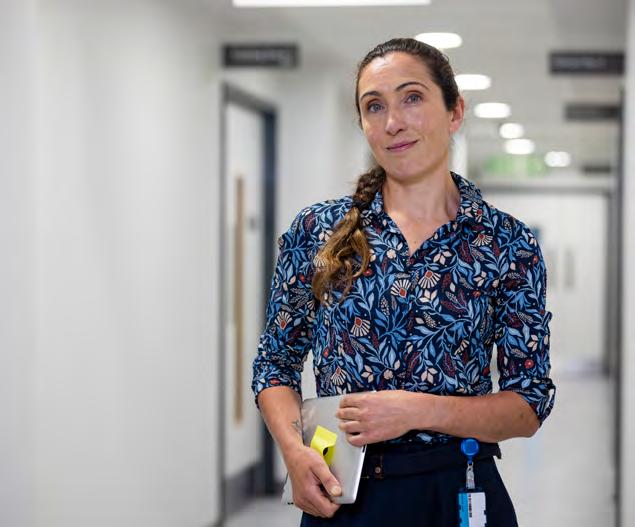
The progress we made during the year
Glaucoma UK represented glaucoma patients at a number of eyecare sector forums during the year, including The Clinical Council for Eye Health Commissioning (CCEHC), The Ophthalmology National Steering Group and The UK Ophthalmology Alliance (UKOA).
The charity was also represented at a National Institute for Health and Care Excellence (NICE) committee meeting regarding approval of the new pressurereducing eye drop, Roclanda.
Glaucoma UK attended two stakeholder meetings with the DVLA during the year, to represent the views and experiences of drivers with glaucoma.
Glaucoma UK staff and members took part in a consultation to help develop a new Eye Care Support Pathway to help transform eyecare services. With far greater emphasis on patient experience, the pathway focuses on the practical and emotional support that individuals need at various stages of their treatment.
Glaucoma UK was delighted to take part in a nation-wide campaign by charities, passenger watchdogs and disability groups to speak out against the proposed mass closures of ticket offices during the year.
The impact on people with living with, or at risk of, glaucoma
As members of the CCEHC, we supported the development of a Clinical Specification for Community Minor and Urgent Eye Care Services. We also shared patient insights with the National Clinical Director as she works on a plan to improve eyecare across the UK.
Through the National Steering Group, we recommended suggested glaucoma research priorities to the National Institute of Health Research (NIHR).
Following the NICE committee meeting, which featured a submission from a Glaucoma UK patient member, the drug Roclanda was approved.
Building upon the launch of the pathway, we are now working with sector partners to develop a glaucoma-specific strand, that will better reflect the particular needs and challenges faced by those living with glaucoma.
Proposals to close ticket offices were withdrawn by train operators in November 2023.
The progress we made during the year
The 2023 UKEGS Conference in London was the biggest in the event’s history, with over 500 delegates. The conference brought together top glaucoma experts, researchers, and professionals for a twoday programme to explore the theme of “Best Evidence for Best Practice”.
We were delighted that the General Optical Council approved our Eye Drop Support training for their CPD scheme during the year, allowing optometrists and dispensing opticians to claim career development points. Course attendees receive Eye Drop Support Boxes containing information on eye drop usage and samples of the aids available to help patients put them in. Over 200 boxes have been distributed across the UK since the scheme was launched in 2022.
Our team of Training and Engagement Officers delivered a new pilot project for pharmacy and optical practice front of house staff, to help them better support people with their eye drops.
The impact on people with living with, or at risk of, glaucoma
The programme included a presentation from the Glaucoma UK CEO, highlighting the anxiety felt by those receiving a glaucoma diagnosis and current shortfalls in patient communication.
100% of course attendees found the dispensing aids useful and 93% found it helpful learn more about the barriers people face in using eye drops. 95% stated that the course taught them something new about glaucoma.
We welcomed 61 attendees to 8 training sessions, with 100% of survey respondents agreeing they would recommend the course.
Nearly three-quarters of our total income was made up of voluntary gifts from our generous members and supporters. This demonstrates the critical role our glaucoma community plays in funding our work and we are deeply grateful to each individual, family, company, trust and foundation that supported us throughout the year. Collectively, our donors helped us to raise just under £1.8 million in support of our efforts to make a difference to people living with glaucoma.
Legacy gifts are essential for us, and we are indebted to the members, supporters, and grateful patients who remember Glaucoma UK in their wills each year. In 202324, we recorded a total of £1,528,917 in legacy income and received 32 new legacy notifications. These gifts are vital not only for sustaining our current work but also for enabling us to plan confidently for the future. Legacy donations are a testament to the positive impact we have had on individuals’ lives, and we are grateful to those who have chosen to support us in such a meaningful way. We are also grateful to their families and friends, many of whom choose to stay in touch and continue their loved one’s support for our work. Legacy gifts ensure that we can continue our mission to prevent sight loss from glaucoma for future generations and allow us to dedicate more funding to essential glaucoma research.
We have, however, seen a decline in the number of new legacy notifications in recent years. With an average 12-month lag time between notification and receipt of the funds, this threatens to have a significant impact on our voluntary income in the medium-term. It is essential, therefore, that we continue to communicate the enormous importance of legacy gifts to our supporters and that we work ever harder to ensure membership of our charity proves to be an invaluable resource for those who need us during their lifetime.
To help ensure a sustainable future for the charity, we have been focusing on diversifying our income to reduce the current strong emphasis on legacy gifts. In 2023-24, we were delighted to receive support from our community via a range of income streams, including membership subscriptions, one-off gifts, responses to
appeals, regular giving, Christmas card sales, In Memoriam donations, corporate partnerships, challenge events, and our weekly lottery. Together, these contributions totalled £363,929, a 34% increase from the previous year (2023: £270,677).
We are always especially touched to receive In Memoriam donations from those who choose to honour their loved ones by directing funeral collections to Glaucoma UK. Income from this source showed a 25% increase year-on-year (2024: £21,185 versus 2023: £16,821).
Our corporate supporters also played a vital role, contributing £84,194 to our income— over five times higher than the previous year (2022-23: £14,649). This increase was largely thanks to our partnership with OcuPlan, who contributed £50,000 towards our community outreach work. We were also grateful to receive £20,000 from our licencing agreement with Specsavers, which steered our joint promotional efforts throughout the year. In addition, for Glaucoma Awareness Week 2024, Specsavers donated a piece of art that had been specially commissioned to show the effects of glaucoma on eyesight. The artwork will be used to help raise awareness of glaucoma and generate funds through auction or sale.
We are thankful for the extraordinary efforts of our challenge fundraisers, whose mental and physical determination raised an impressive


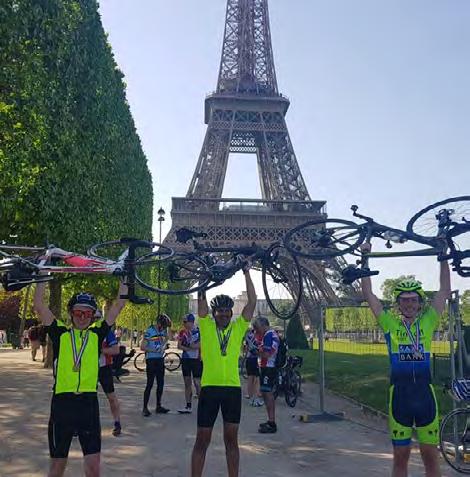
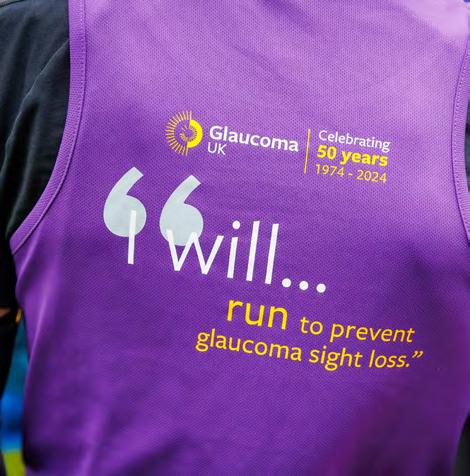
£80,022 for Glaucoma UK in the past financial year - exceeding our previous highest-ever year in 2022-23. It was especially heartening to see how the number of challenge fundraisers has increased from only three participants a few years ago to 18 people in 202324, highlighting the growing strength and commitment of our glaucoma community.
We were particularly grateful to Martin Higgins, a distinguished former member of the RAF Red Arrows, who took on a monumental challenge to run from Land’s End to John o’ Groats to raise awareness of glaucoma as part of our 50th anniversary celebrations. Martin’s efforts raised a total of £18,625 – representing almost half of the £38,970 raised from our members and supporters towards the charity’s new Pitts-Crick Research Fellowship.
Over 30 years since he last attempted the feat in aid of Glaucoma UK, former Chair and Consultant Ophthalmologist, Michael Miller ran the London Marathon in April. Thanks to his incredible efforts, Michael raised £21,238 for the charity.
Once again, Professor Keith Barton, Consultant Ophthalmic Surgeon at Moorfields Eye Hospital and former Chair of Glaucoma UK, undertook the gruelling London to Paris bike ride in aid of Glaucoma UK. Crossing the finishing line in under 24 hours, his achievement raised £30,329. This brings Keith’s remarkable fundraising total to over £168,000 for Glaucoma UK in the last 11 years.
A special thanks also goes to James Broadbent, who took on the challenge of cycling a distance equivalent to the height of Everest—nearly 8,850 metres—raising £3,830 in the process. We are equally grateful to Connor Bice, who cycled an impressive 150 miles - the equivalent distance from his family home to Birmingham Children’s Hospital and back - to raise awareness of primary congenital glaucoma following his daughter’s diagnosis at just seven months old. Connor’s incredible effort raised £3,025. Our thanks, also, to Tanika, Sally, Richard, Beth, Francesco, Grace, Katy and Kathryn who took part in various marathons, runs and walks across the UK to raise funds in support of our essential work.
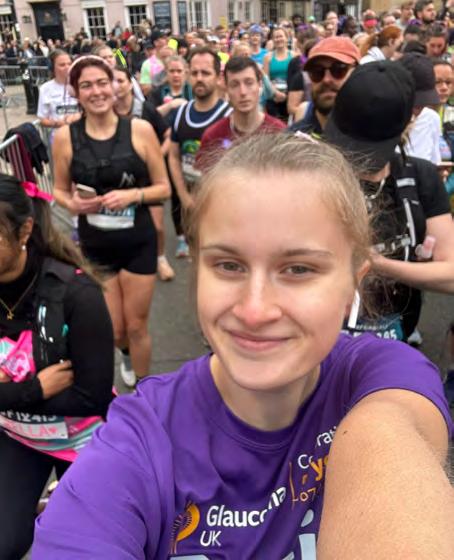


Organisations who helped us
We would like to take this opportunity to thank the following organisations for their support during the year:
ELIOS Vision
Envision Pharma Group
Glaukos
Harry and Gertrude Landy Charitable Trust
i-STAR Medical
KMS (UK) LTD
Medicom Healthcare
OcuPlan
Pinner Folk and Blues Club
Santen UK
Specsavers
Stranraer Folk Club
The Dandy Charitable Trust
The Emily Weircroft Charitable Trust
The Masonic Lodge of Equity No. 3692
The Monk Bretton Charitable Trust
The Wyndham Charitable Trust
Théa Pharma UK
Wyseliot Rose Charitable Trust
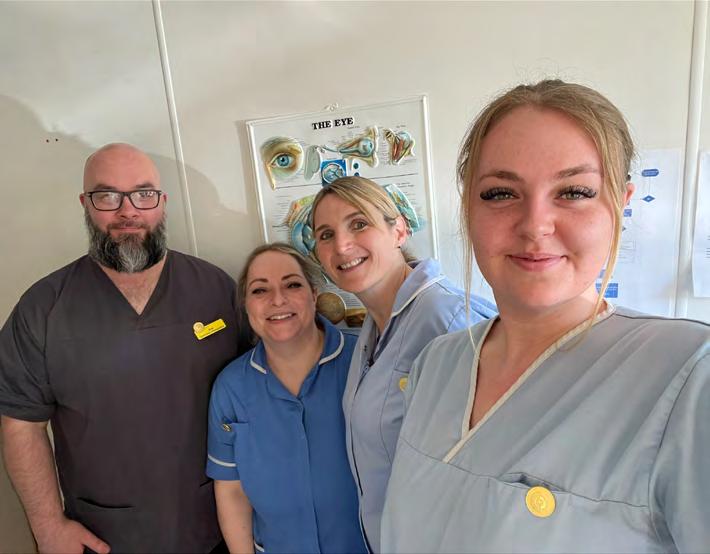

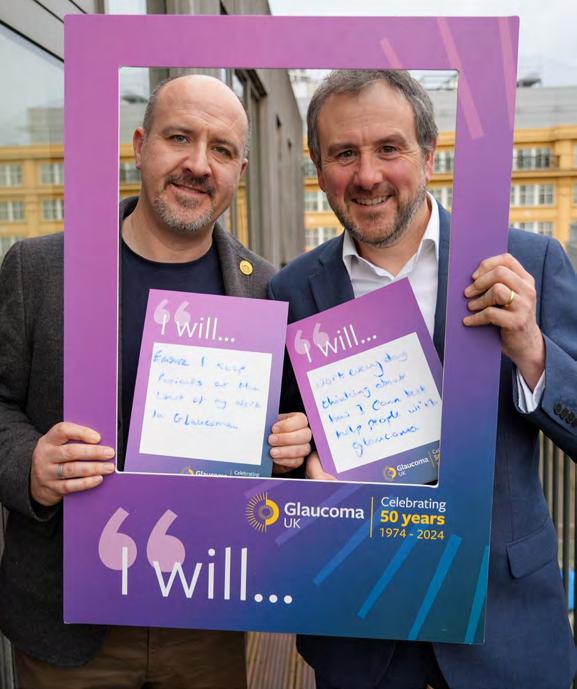
Securing and maintaining the trust of our donors and the public is vital to the success of our fundraising activity. We therefore have controls in place to ensure our fundraising is transparent, ethical and compliant with current regulations. We have the benefit of a designated Fundraising Trustee Advocate on our Board of Trustees, to ensure oversight at the highest level. In addition, our Finance and Governance Committee monitors fundraising performance, control and regulation through quarterly reviews.
Glaucoma UK is registered with the Fundraising Regulator and follows the Code of Fundraising Practice. We comply with the key principles embodied in the Code and are committed to the Fundraising Promise. Our website carries our complaints policy for the public and explains clearly how an individual may complain. We received no complaints from August 2023 - July 2024. We are also registered with the Fundraising Preference Service so that individuals can opt out from receiving fundraising communications, should they wish. We received no such requests during the year.
To ensure that all reasonable steps are taken to protect vulnerable adults, Glaucoma UK complies with the Institute of Fundraising guidance relating to the needs of people in vulnerable circumstances and our activities are governed by an Ethical Fundraising Policy and Supporter Promise.
Glaucoma UK monitors any third parties working with us to help raise funds, ensuring that they adhere to the Code of Fundraising Practice and are operating to the highest possible standards of respect for the personal data and wishes of our supporters and prospective supporters. We worked with one third party –Bequeathed Limited - in the delivery of a free wills service, but did not work with any external professional fundraising agencies during the year.
Our Lottery activities are managed under our Gambling Commission licence which ensures we can meet our legal obligations and provide the necessary protections for our players.
With 50 years of history to build upon, we now have an exciting opportunity to set out ambitious and inspiring plans for the future. Our ultimate goal is to ensure that the charity doesn’t exist to celebrate its 100th anniversary. By finding that all-elusive cure for glaucoma, we can eliminate the need for our services. It’s a tall order, but one that merely serves to sharpen our focus and determination.
In pursuit of this goal, we will be working towards a number of exciting outcomes in 2024-25:
Our programme to maximise our impact across the UK will continue in the coming year, with investment in new colleagues to help grow and develop our fundraising, outreach, helpline and digital communications activities.
Our team of training and engagement officers will be developing a series of pilot projects to engage those at highest risk of glaucoma sight loss in targeted communities across the four nations. This will help to identify exactly what effective community engagement for underserved audiences looks like and will enable us to collect valuable impact data to help seek funding to roll out this work across the UK in due course.
We have welcomed lots of new members to the charity as a result of our anniversary year celebrations and so this is the perfect time to collect more comprehensive and up-to-date information on glaucoma patient perspectives. We will be collecting feedback from our members on a wide range of topics across the coming year in order to more accurately and effectively represent their views and concerns to those who develop policy, provide treatment and make decisions about glaucoma care.
The appointment of a Head of Research in early 2024 is already paying significant dividends for our work in this area and we will be further expanding our research funding in the coming year. In addition to the introduction of the charity’s firstever Career Development Research Fellowship, we will be offering a second PhD studentship and working with other sight sector charities to explore options for transformational partnership projects. Having the benefit of our £3.87 million Designated Research Fund offers an exciting opportunity to invest in more ambitious, larger scale projects that have the potential to transform current approaches to the diagnosis, treatment and monitoring of glaucoma.
We will be exploring the potential offered by artificial intelligence to assist our work in the coming year and will be increasing the use of automation within Glaucoma UK’s administrative systems. This will free up the time available for engaging with audiences and developing new products and services for people living with glaucoma.
Following on from our achievement of PIF Tick accreditation for our health information, we will be signing up to the Helplines Partnership Quality Standard in 2024-25 to further improve the service we offer for those reaching out to us for help and advice.


Against the backdrop of a mixed, but gradually improving economic environment, Glaucoma UK ended the Financial Year 2023-24 with a net increase in funds of £720,213. This takes the charity’s total funds to £8,767,960 (2023: £8,047,747).
Net income showed a surplus of £280,305, largely due to the receipt of an unusually large legacy during the year. Expenditure increased to £2,077,745, up 18.5% on the previous year, in line with the strategic objective to maximise Glaucoma UK’s reach and expand services in the coming three-to-five year period.
With recession avoided after the inflationary pressures of the previous year, movements in the stock market resulted in unrealised gains of £439,908 on our investment portfolio.
At £2,358,050, total income was up 33% on the previous year (2023: £1,773,879). This was thanks to an exceptional legacy (the largest in the charity’s history) which resulted in a growth in voluntary income of £303,273 year-on-year (2024: £1,787,919 versus 2023: £1,484,646)
Legacies remain a crucial revenue stream for Glaucoma UK, representing just under 70% of total income, on average, over the last five years. As in the previous year, we continued to receive more complicated bequests, often resulting in an extension in the time between being notified of a gift and receiving the funds. This is reflected in the legacy debtor figure, which remains high at £1,619,363. In recent years, we have invested in additional staff resource and worked to further improve our administrative systems in an ongoing drive to reduce that figure.
Income from our charitable activities was up by £245,161 on the previous year (2024: £370,197 versus 2023: £125,036). This was due in part to higher sponsorship and delegate income for our UK and Eire Glaucoma Society (UKEGS) Conference and also the receipt of £81,950 in relation to corporate support, including our partnership agreements with Specsavers (£20,000) and
OcuPlan (£50,000). In addition to the benefits these partnerships bring in helping to amplify our key messages and supporting the delivery of our strategic objectives, this is an increasingly important income stream for the charity as we seek to reduce the emphasis on legacy gifts. Work to develop this area will continue throughout the strategic plan period, but with due regard to the importance of independence and objectivity in the charity’s activities and decision-making.
We benefitted from the Google Ads grant scheme during the year, with free advertising to the value of $64,861 (£50,449 as at 31 July 2024). Google Ads enabled us to serve advertisements to people searching online for particular keywords and encourage traffic to the charity’s website.
Resources expended
Total expenditure in the year was £2,077,745, up by £324,521 on the previous year (2023: £1,753,224). As we continue to build capacity within our team and expand our activities to more effectively deliver our Theory of Change, staff costs accounted for 43% of this increase, rising to £975,235 from £835,770 in 2023.
During the year, we introduced the role of Head of Research, the charity’s first ever designated resource in this important strategic area. To help
address growing demand in both the number and nature of helpline calls, we also invested in a third helpline advisor. Total staff numbers at the yearend were 22.88 (full-time equivalent) compared to 18.53 at the end of 2023. Other areas of expenditure growth included the costs of a larger, more expensive London-based UKEGS conference and more expenditure on patient education, including our ongoing work to update and reprint our suite of information booklets.
We accounted for £363,222 in respect of new research grants awarded during the year. This was down by £45,438 on the previous year (2023: £408,660), due to a third-party contract delay that remained unresolved at the financial year end. Taking account of the £49,489 delayed award, we actually granted £412,711 in funding for new projects, which was the highest figure to date and maintains our strategic drive to increase the impact of our research support. In a move to address timing issues at the financial year end, we will be redesigning our grant awards programme in 2024-25. Total expenditure on research, including staff costs, premises, administration and professional fees was £431,080 during the year.
Of total funds at the year end, the sum of £1,629,943 was restricted. The
majority (£1,504,578) represents the Chair Fund, which will support the Chair of Ophthalmology for Glaucoma and Allied Studies until his term comes to an end in March 2028. Of the remainder, £75,223 is restricted to the delivery of the UK and Éire Glaucoma Society (UKEGS) conference, and the rest is allocated to a range of specific small projects at the request of the donors.
We introduced a new restricted fund during the year – the 50th Anniversary Fund - for donations towards our new Pitts-Crick Research Fellowship.
The policy of the trustees is to maintain at least the minimum of cash reserves and working capital sufficient to meet known development plans, as well as the day-to-day needs of the charity. Funds are also held in reserve to provide secure, sustainable support for our beneficiaries and to ensure we can commit to ambitious, long-term plans to help bring an end to sight loss from glaucoma.
The Trustees recognise the risk to income posed by the reliance on legacy gifts and factors outside the organisation’s control, such as economic uncertainty and investment volatility. Having considered these factors, the Board of Trustees agreed to maintain cash reserves of 12 months’ operating costs during the year.
General funds totalled £2,797,225 (2023: £2,140,977) against a cash reserves requirement of £2,005,807 at the yearend. The surplus will support the delivery of the new Theory of Change framework and the expansion of our services in the period 2023-2026.
Other unrestricted funds at the yearend amounted to £4,340,791 (2023: £4,387,968). Of the total, £3,878,078 is designated to the funding of research, including a contribution to the new Pitts-Crick Research Fellowship, the recruitment of a new PhD Studentship in 2025 and new partnership initiatives currently in development with other research charities in the sight sector. A further £434,745 remains designated for equipment replacement and infrastructure development, which will include modernisation of the Head Office environment (scheduled for 2025) and the subsidy of two new posts to strengthen our staffing infrastructure as we work to grow additional income.
In assessing the charity’s status as a going concern, the trustees have considered a range of information in relation to the financial year ahead, including the current status of the UK economy, the charity’s cash resources and known liabilities.
The charity’s three-year financial plan for the period 2024 – 2027 shows the charity to have adequate resources to continue operating an effective service
for at least 36 months and to meet its obligations as they fall due. The financial statements have therefore been prepared on a going concern basis.
The charity’s assets are invested in the Rathbone Core Investment Fund for Charities, with management delegated to Rathbone Investment Management Ltd. A total return approach is adopted for the portfolio and withdrawals can be comprised of physical income and/or capital gain.
Our Investment Policy is:
• To maximise total return subject to a medium level of risk.
• To ensure that the charity’s assets are invested widely and diversified by asset class and by security.
• To avoid direct investment in any companies manufacturing tobacco or tobacco products.
• To avoid investment in any companies that derive more than 10% of their revenues from the manufacture of alcoholic beverages, armaments, gambling, high interest rate lending or pornography.
Responsibility for monitoring the performance of the investment portfolio is delegated to the Finance and Governance Committee and performance benchmarks are reviewed with the fund managers on an annual basis.
The total value of our investment portfolio at the year-end was £7,481,616, an increase of £621,627 on the previous year (2023: £6,859,989). A total of £198,496 in dividends was reinvested into the portfolio and no funds were drawn down during the year. The fund benefited from unrealised gains totalling £439,908.
The investment portfolio underperformed against the composite index benchmark by 2% during the year but outperformed its peer group. In reviewing the Investment Policy for 2024-25, the trustees were mindful that the aim of the portfolio is to maximise total return subject to a medium level of risk over the long term. The decision to maintain the risk profile and retain the fund at its current level was taken after consideration of steady economic growth in the UK and Eurozone, continued reduction in inflation and the reasonable health of the US economy.
Trustees, advisors and staff
The trustees (who are also directors under company law) are:
Professor Anthony King Chair
Mr Stephen Epstein Vice Chair (Chair, Finance & Governance Committee)
Mr Prabhakar Sundaresan Hon Treasurer (Finance & Governance Committee)
Miss Winifred Nolan Chair, Clinical Advisory Panel
Dr Susan Blakeney (Finance & Governance Committee)
Ms Teresa Borsuk (Finance & Governance Committee)
Dr Roxanne Crosby-Nwaobi
Mr Julian Exeter (Retired, 14 March 2024)
Professor Cecilia Fenerty
Mrs Yolanda Laybourne
Professor Roshini Sanders
Mr Raymond Spendiff
Mr Christopher Hunton
Fundraising Advocate (Finance & Governance Committee) (Finance & Governance Committee)
Chair Fund Advocate (Since 14 March 2024previously co-opted)
Chief Executive & Company Secretary Joanne Creighton
Company Number 1293286
Charity Number 274681
OSCR Number SC041550
Registered office & operational address
Bankers
Auditors
Investment Managers
Woodcote House, 15 Highpoint Business Village, Henwood, Asford, Kent, TN24 8DH www.glaucoma.uk
Barclays Bank plc, 1 Churchill Place, London, E14 5HP
CAF Bank Ltd, 25 Kings Hill Avenue, Kings Hill, Kent, ME19 4JQ
HSBC Bank plc, Camberwell Green, 23 Denmark Hill, London, SE5 8RP
Xeinadin Audit Limited, 12 Conqueror Court, Sittingbourne ME10 5BH
Rathbones Investment Management Ltd, 30 Gresham Street, London EC2V 7QN
Glaucoma UK is the operating name of the International Glaucoma Association Ltd, which was incorporated on 15 July 1976 and registered as a charity on 20 December 1977. As Glaucoma UK is both a charity and a company limited by guarantee, all board members are directors for the purposes of company law and trustees for the purposes of charity law. The objects of the charity are defined by its Articles of Association (last updated in 2024), which also set out trustees’ powers and the permitted activities of the charity.
As we entered our 50th anniversary year, there was a useful and welcome opportunity to review and refresh the Articles of Association to ensure our governing document remains fit for purpose into the next half-century. Changes included:
• Simpler language to improve readability and transparency.
• Updated terminology, e.g. ‘Charity’ not ‘Foundation’.
• Removal of obsolete clauses.
• Updated Objects to include a specific reference to providing advice and support, which is now such a vital aspect of our work.
• Modernisation of our activities, e.g. communication via electronic means and the holding of virtual meetings if required.
• Clarification of the Board’s powers, e.g. explicit reference to employing staff and procuring consultancy advice as necessary.
• Increased flexibility, most notably the ability to award a research grant to a project led by a serving trustee, subject to the appropriate conflict of interest controls.
• Improved clarity around the role and powers of our members to help as we seek to recruit more members and encourage more people to exercise their right to vote.
The membership approved the revised Articles of Association at the AGM on 14 March 2024.
The Board comprises not fewer than 8 and no more than 15 persons elected by the Members (or appointed by the Board to fill a temporary vacancy); and not more than three persons co-opted by the Board.
The current Board comprises people living with glaucoma, those with close family connections with the condition and others with backgrounds in ophthalmology, nursing, optometry, finance, public relations and business. At least three trustee positions are held each year by Fellows of The Royal College of Ophthalmologists or medically qualified equivalents. Trustees retire after serving a threeyear term but are eligible for re-election to a maximum of nine years’ service. Those serving prior to the 2023 AGM are entitled to serve for a maximum of 12 years. Board meetings take place four times a year on either a face-toface, virtual or hybrid basis. There is one sub-committee: the Finance and Governance Committee, which has delegated responsibility to oversee finance, investments, risk management and policy. Consisting of six trustees, the committee meets quarterly in advance of each Board meeting and on an ad-hoc basis, should the need arise.
The charity also has a Clinical Advisory Panel (CAP) to advise on clinical
matters. The chair of the CAP oversees the award of research grants.
When seeking new Board members, trustees have regard to any existing skills or knowledge gaps or any new disciplines that would be helpful in delivering the charity’s future plans. Due consideration is also given to diversity and the need to ensure that the Board appropriately represents the communities served by the charity. New trustees are sought using existing networks, advertising or professional recruitment agencies, as required. Candidates are interviewed by a subcommittee of trustees, followed by a meeting with the Chair. Suitable individuals are invited to meet the remaining trustees at a Board meeting and are then put forward to the membership as the Board’s preferred candidates at the Annual General Meeting. Voting members are also eligible to nominate themselves or others for election.
A Trustee Handbook sets out trustee roles and responsibilities. A personalised induction is provided for all new trustees, including a charity overview and briefings on finance, fundraising, support services and communication. Direction is also provided on the Charity Commission Guidance, ‘The Essential Trustee’ and
trustees are required to undertake ‘Understanding Governance’ training within six months of joining the Board. Ongoing training is provided as required, including attendance on external courses or participation in internal workshops and briefings.
Day-to-day responsibility for delivering services and achieving strategic and financial aims within organisational policies and the law is delegated to the Chief Executive, supported by the Senior Management Team.
Glaucoma UK exists to raise awareness of the risks of glaucoma, support people to live well with the condition and fund research into the causes, prevention and treatment of the disease.
When reviewing the charity’s objectives and planning future activities, the trustees refer to Charity Commission guidance on public benefit and can confirm that all Glaucoma UK’s activities are undertaken to further our charitable purposes for public benefit, in accordance with Section 17 of the Charities Act 2011.
Related parties and connected charities
Glaucoma UK acted as an agent for the unincorporated organisation the United Kingdom Paediatric Glaucoma Society (UKPGS) during the year, providing infrastructure and administrative support. UKPGS exists to promote the exchange of knowledge between glaucoma specialists, stimulate research, establish a scientific community and promote interest in glaucoma as an ophthalmological subspecialty. One trustee of Glaucoma UK also sits on the trustee board of UKPGS.
In 2022 Glaucoma UK awarded a research grant of £57,300.56 to Nottingham University Hospitals NHS Trust in respect of a project for which Glaucoma UK Chairman, Anthony King, is lead researcher. In this financial year, a payment of £25,785 was made in respect of the ongoing project.
Overall responsibility for the charity’s risk management lies with the Board of Trustees, with formal assessment and review delegated to the Finance and Governance Committee. A risk register is submitted by the Chief Executive on a quarterly basis which identifies current and new risks, rates each in terms of likelihood, probability and velocity and identifies appropriate controls and mitigations. Structure and
The trustees have assessed the major risks to which Glaucoma UK is exposed as follows:
Although work to diversify income streams continues, the charity is still heavily dependent on gifts in wills, with legacy income representing 65% of total income in the year 2023-24. The following measures are in place to mitigate this risk:
Income position monitored via monthly management accounts and quarterly reports to the Finance & Governance Committee.
• Cash flow forecasts and legacy gift pipeline report presented at each quarterly Finance & Governance Committee meeting.
• Reserves holding and investment portfolio with diversified risk to cover medium and longer-term income shortfalls.
• Staff capacity increased in the fundraising department in 2023 to create additional resource for income diversification and speed up the administration of legacy gifts.
• New Theory of Change framework and outcome reporting mechanisms in place to better demonstrate the charity’s impact and secure higher levels of corporate sponsorship, major donor funding and charitable trust support.
All investments are at risk of sustained and long-term fall in value of funds held in stock markets. The Board of Trustees seeks to offset risks to its investment holdings in the following ways:
• Investments held in a professionally managed portfolio.
• Access to live online investment reports.
• Quarterly reporting to Finance and Governance Committee and annual meeting with investment managers.
• Investment Policy reviewed annually.
• Minimum of three months’ operating costs held in cash account.
In response to increasing levels of cybercrime in the UK and a tightly regulated data protection environment, the following mitigations are in place:
• Retained professional support for staff training and regular system security monitoring.
• Cyber Essentials accreditation achieved in June 2024.
• Cyber training programme in place for all staff.
• ‘reCAPTCHA’ technology installed on the Glaucoma UK website shop to prevent automated transactions.
• Daily offsite backup and office-hours support contract in place.
• Appropriate policies in place (Information Governance, ICT, Data Protection) and subject to annual review.
• Cyber insurance in place, with support for post-incident management.
• Multi Factor Authentication enforced on all available systems.
• Strict access controls to ensure that only authorised personnel can access sensitive information and systems.
• Regular software updates and patch management to protect against known vulnerabilities.
• Intrusion Detection and Prevention Systems (IDPS) to monitor network traffic for suspicious activity and prevent potential threats.
• Firewall, antivirus and anti-malware software in place.
• Encryption of sensitive data.
The trustees consider the Chief Executive and the Senior Management Team as comprising the key management personnel, in charge of directing, controlling and operating the charity on a day-to-day basis.
All trustees give of their time freely and no trustee remuneration was paid in the year. Trustees are required to disclose all relevant interests and withdraw from decisions where a conflict of interest arises.
The pay of the charity’s Chief Executive is reviewed annually by the Board Chair and Finance and Governance
Committee. The Chief Executive reviews all other staff salaries annually and makes recommendations to the Board as part of the annual budget setting process.
When setting salaries, trustees are guided by a remuneration policy that considers factors such as pay comparability (benchmarked within our own sector but also referencing public and private sector pay increase estimates), affordability, sustainability, and appropriateness. Glaucoma UK aims to set salaries at a level where the ratio between the highest and lowest full-time equivalent is below 4.5:1 and the ratio between the highest and median (midpoint) salary is less than 3.5:1. As at 1 August 2024 these ratios were 3.6:1 and 2.7:1 respectively.
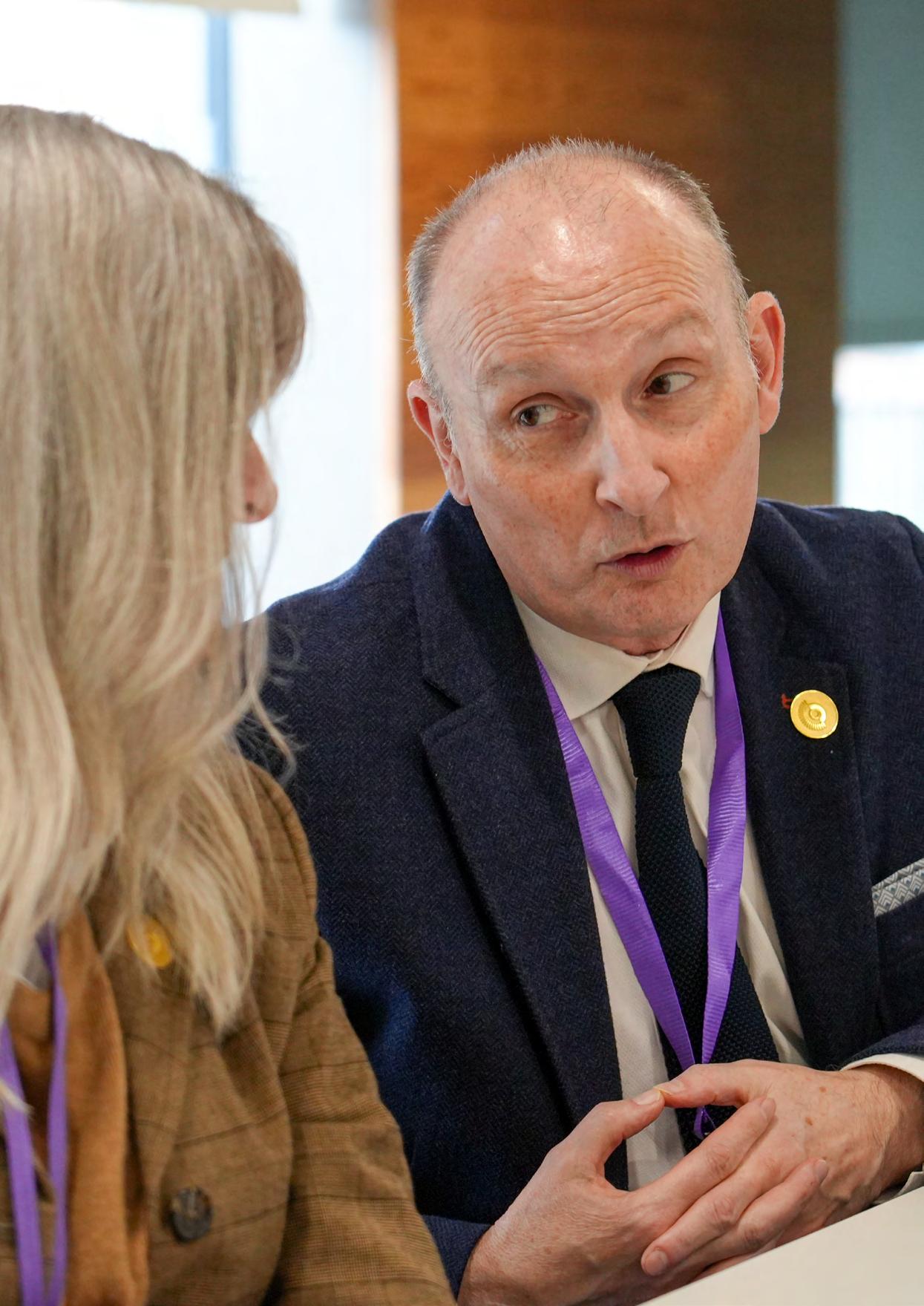
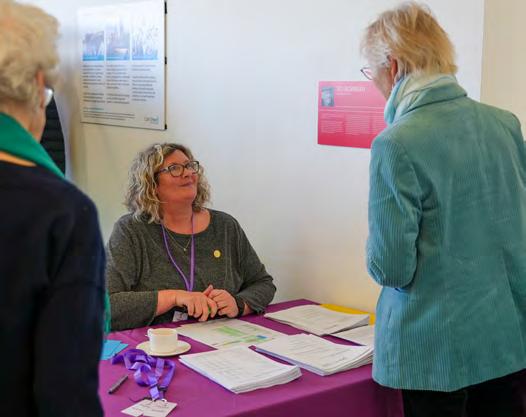
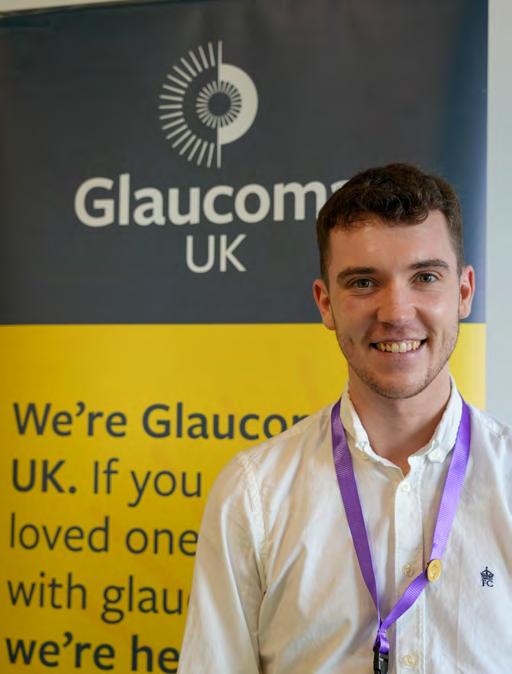
The trustees are responsible for preparing the Trustees’ Annual Report including the strategic report and financial statements in accordance with applicable law and United Kingdom accounting standards (UK generally accepted accounting practice).
Company law requires the trustees to prepare financial statements which give a true and fair view of the state of affairs of the charitable company and of the incoming resources and application of resources, including the income and expenditure of the charitable company for that period. In preparing these financial statements, the trustees are required to:
• select suitable accounting policies and then apply them consistently;
• observe the methods and principles in the Charities SORP;
• make judgments and estimates that are reasonable and prudent;
• state whether applicable UK accounting standards have been followed, subject to any material departures disclosed and explained in the financial statements;
• prepare the financial statements on the going concern basis unless it is inappropriate to presume that the charitable company will continue in business.
The trustees are responsible for keeping proper accounting records that disclose with reasonable accuracy at any time, the financial position of the charitable company and enable them to ensure that the financial statements comply with the Companies Act 2006. They are also responsible for safeguarding the assets of the charitable company and hence for taking reasonable steps for the prevention and detection of fraud and other irregularities.
The trustees are responsible for the maintenance and integrity of the corporate and financial information included on the charitable company’s website. Legislation in the United Kingdom governing the preparation and dissemination of financial statements may differ from legislation in other jurisdictions.
In so far as the trustees are aware:
• there is no relevant audit information of which the charitable company’s auditor is unaware; and
• the trustees have taken all steps that they ought to have taken to make themselves aware of any relevant audit information and to establish that the auditor is aware of that information.
The Trustees’ Annual Report is approved by order of the Board of Trustees, and the Strategic Report (included therein) is approved by the Board of Trustees in their capacity as directors on 20th February 2025 and signed on their behalf by
Professor Anthony King Chair
We have audited the financial statements of The International Glaucoma Association Limited for the year ended 31 July 2024 on pages 60 to 75. The financial reporting framework that has been applied in their preparation is applicable law and FRS 102 (effective January 2015), as well as the Statement of Recommended Practice for Charities (effective January 2015).
This report is made solely to The International Glaucoma Association’s members and Board of Trustees, as a body, in accordance with Section 144 of the Charities Act 2011, and regulations made under Section 154 of that Act, as well as Section 44 (1) ( c ) of the Charities and Trustee Investment (Scotland) Act 2005 and the Charities Accounts (Scotland) Regulations 2006. Our audit work has been undertaken so that we might state to the charitable company’s members and Council of Management those matters we are required to state to them in an auditors’ report and for no other purpose. To the fullest extent permitted by law, we do not accept or assume responsibility to anyone other than the charitable company and the charitable company’s trustees as a body, for our audit work, for this report, or for the opinions we have formed.
As explained more fully in the Trustees’ Responsibilities set out on pages 54 and 55, the trustees (who are also the directors of the charitable company for the purposes of company law) are responsible for the preparation of the financial statements and for being satisfied that they give a true and fair view.
We have been appointed as auditors under Section 44 (1) ( c ) of the Charities and Trustee Investment (Scotland) Act 2005 and the Charities Accounts (Scotland) Regulations 2006 and report in accordance with regulations made under those Acts. Our responsibility is to audit and express an opinion on the financial statements in accordance with applicable law and International Standards on Auditing (UK and Ireland). Those standards require us to comply with the Auditing Practices Board’s Ethical Standards for Auditors.
An audit involves obtaining evidence about the amounts and disclosures in the financial statements sufficient to give reasonable assurance that the financial statements are free from material misstatement, whether caused by fraud or error. This includes an assessment of whether the accounting policies are appropriate to the charitable company’s circumstances and have been consistently applied and adequately disclosed; the reasonableness of significant accounting estimates made by the trustees; and the overall presentation of the financial statements. In addition, we read all the financial and non-financial information in the Trustees’ Annual Report to identify material inconsistencies with the audited financial statements and to identify any information that is apparently materially incorrect based on, or materially inconsistent with, the knowledge acquired by us in the course of performing the audit. If we become aware of any apparent material misstatements or inconsistencies, we consider the implications for our report.
Irregularities, including fraud, are instances of non-compliance with laws and regulations. We design procedures in line with our responsibilities, outlined above, to detect material misstatements in respect of
irregularities. The extent to which our procedures can detect irregularities, including fraud, is detailed below:
• Gaining a full and extensive knowledge of the entity, environment and the regulatory framework to which it must abide by.
• Evaluating and assessing the extent to which the entity’s internal systems are adhering to these as well as gaining a full and comprehensive understanding of the entity’s activities and effectiveness of its control environment (including those in place to identify and prevent fraud).
We achieved this by carrying out the following:
• Enquiry of the detailed communication with management and those charged with governance.
• Reviewing internal systems and controls.
• Reviewing financial statement disclosures and compliance with applicable laws and regulations.
In auditing the financial statements, we have concluded that the trustees/ directors’ use of the going concern basis of accounting in the preparation of the financial statements is appropriate.
Based on the work we have performed, we have not identified any material uncertainties relating to events or conditions that, individually or collectively, may cast significant doubt on the entity’s ability to continue as a going concern for a period of at least twelve months from when the financial statements are authorised for issue.
Our responsibilities and the responsibilities of the trustees/directors with respect to going concern are described in the relevant sections of this report.
In our opinion, the financial statements:
• give a true and fair view of the state of the charitable company’s affairs as at 31 July 2024 and of its incoming resources and application of resources, including its result, for the year then ended;
• have been properly prepared in accordance with the Financial Reporting Standards 102 (effective January 2015);
• have been prepared in accordance with the requirements of the Companies Act 2006, and Section 44 (1) ( c ) of the Charities and Trustee Investment (Scotland) Act 2005 and the Charities Accounts (Scotland) Regulations 2006.
Matters on which we are required to report by exception
We have nothing to report in respect of the following matters where the Companies Act 2006, the Charities Act 2011 and the Charities Accounts (Scotland) Regulations 2006 requires us to report to you if, in our opinion:
• the information given in the Report of the Board of Trustees is inconsistent in any material respect with the financial statements; or
• the charitable company has not kept adequate accounting records; or
• the financial statements are not in agreement with the accounting records and returns; or
• we have not received all the information and explanations we require for our audit.
Rosanna Turner
For and on behalf of Xeinadin Audit Limited, Registered Auditors
12 Conqueror Court, Sittingbourne ME10 5BH
Eligible to act as an auditor in terms of Section 1212 of the Companies Act
the year ended 31 July 2024
Glaucoma UK (the operating name of the International Glaucoma Association Limited). Charity No. 274681, in Scotland No. SC041550. Company No. 1293286
incorporating an income and expenditure account
For the year ended 31 July 2024
of
All of the results above are derived from continuing activities. There were no other recognised gains or losses other than those stated above. Movements in funds are disclosed in Note 17 to the financial statements. Glaucoma UK (the operating name of the International
As at 31 July 2024
1. Accounting policies
a) The financial statements have been prepared under the historical cost convention, as modified by the revaluation of fixed asset investments, and in accordance with applicable accounting standards and the Companies Act 2006. They follow the recommendations in the Statement of Recommended Practice, Accounting and Reporting by Charities. The accounting standards policies have been prepared under Financial Reporting Standard 102, the Financial Reporting Standard applicable in the UK and Republic of Ireland’ (United Kingdom Generally Accepted Accounting Practice) and SORP 2019.The Trustees confirm that the charitable company is a public benefit entity. The accounts are prepared in sterling pound and rounded to the nearest £1. The charity is a company limited by guarantee from 627 voting members incorporated on 15 July 1976 and registered as a charity on 20 December 1977. The objects of the charity are defined by its Articles of Association updated in March 2012. The International Glaucoma Association (IGA) is constituted both as a charity and as a company limited by guarantee and as such the members of its council are directors for the purposes of company law and trustees of the charity for the purposes of charity law. The powers of the council and the permitted activities of the association are described in its governing document, which is the Articles of Association. The International Glaucoma Association registered office is Woodcote House, 15 Highpoint Business Village, Henwood, Ashford, Kent, TN24 8DH. The International Glaucoma Association is registered as a company in the United Kingdom.
In assessing the charity’s status as a going concern, the trustees have considered a range of information in relation to the financial year ahead, including the current status of the UK economy, the charity’s cash resources and known liabilities. The charity’s 3-year financial plan for the period 2024-2027 shows the charity to have adequate resources to continue operating an effective service for at least 36 months and to meet its obligations as they fall
due. The financial statements have therefore been prepared on a going concern basis.
b) Voluntary income received by way of subscriptions, donations and gifts are included in full in the statement of financial activities when receivable.
c) Income from legacies is accounted for on a receivable basis, recognised when entitlement to the income has been established and it is probable that Glaucoma UK will receive the amounts ascertained. This treatment is within SORP 2019 and Financial Reporting Standard 102 the Financial Reporting Standard applicable in the UK and Republic of Ireland (United Kingdom Generally Accepted Accounting Practice).
Sales income represents sale of goods excluding VAT where appropriate.
Investment income is accounted for on an accruals basis.
d) Restricted funds are to be used for specific purposes as laid down by the donor. Expenditure which meets these criteria is charged to the fund.
e) Unrestricted funds are donations and other incoming resources received or generated for general charitable purposes.
f) Designated funds are unrestricted funds earmarked by the Board of trustees for particular purposes. Within these funds is money awarded as grants, funding a range of research projects to develop more effective methods of glaucoma diagnosis and treatment.
g) Costs of generating funds relates to the costs incurred in fundraising activities.
h) Critical accounting judgements are used within these accounts as follows:
Residual legacy income debtors are valued at 85% of the expected value of the legacy when certain criteria are met and receipt is probable. Residual legacies that are over the material
amount set by Glaucoma UK at £300,000 are recorded in the accounts at 100% once criteria is met and receipt is probable.
The support and governance costs are reapportioned by staff time as explained in note (i). The staff costs attributed to each activity are reviewed each year when the new budget is set.
Resources expended are recognised in the period in which they are incurred. Resources expended include attributable VAT which cannot be recovered.
i) Resources expended are allocated to a particular activity where the cost relates directly to that activity. However, the cost of overall direction and administration of each activity, comprising the salary and overhead costs of the central function which includes finance and support and governance is apportioned on the following basis which is an estimate based on staff time of the amount attributable to each activity.
Support costs
j) Grants awarded are charged to the Statement of Financial Activities in the year in which they are awarded and are subject to receipt of progress reports.
k) Governance costs are the costs associated with the governance of the charity, including constitutional and statutory requirements and costs associated with the strategic management of the charity’s activities.
l) Monetary assets and liabilities in foreign currencies are translated into sterling at the Bank of England exchange rate for that day.
m) Investments held as fixed assets are revalued at market value at the balance sheet date. The Trustees consider that market value is a reasonably accurate representation of the fair value. The gain or loss for the period is taken to the statement of financial activities.
n) The fixed assets are held at cost less depreciation and any impairment. Depreciation is provided at rates calculated to write down the cost of each asset to its estimated residual value over its expected useful life. The depreciation rates in use are as follows:
Fixtures, fittings and equipment
Items of equipment are capitalised where the purchase price exceeds £1,000. Depreciation costs are allocated to activities on the basis of the use of the related assets in those activities. Assets are reviewed for impairment if circumstances indicate their carrying value may exceed their net realisable value and value in use.
o) Stocks are stated at the lower of cost and net realisable value. In general, cost is determined on a first in first out basis. Net realisable value is the price at which stocks can be sold in the normal course of business after allowing for the costs of realisation. Provision is made where necessary for obsolete, slow moving and defective stock. During the year the charity received donated items that have been stated at fair value.
p) The charity contributes to a defined contribution pension scheme. The assets of the scheme are held separately from those of the charity in an independently administered fund. Contributions payable are charged as an expense in the SOFA (Statement of financial activities) within staff costs then shared between the SOFA categories by staff time within these activities.
q) Financial instruments assets and liabilities are valued in the accounts at fair value and are subsequently carried at amortised cost shown in Note 20.
r) Debtors are stated at their net realisable value after allowing for bad and doubtful debts. The recoverability of debtors is reviewed at year end and provision is made, either general or specific, based on value, age and composition of our year end debtor balance.
s) Trade creditors are recognised in the accounts at its settlement amount when there is a present obligation to the entity arising from past events.
* Includes UK and Éire Glaucoma Society
2,077,745 1,753,224 Notes to the financial statements for the year ended 31 July 2024
This is stated after charging/crediting:
for the year - owned
Trustees expenses represent the travel and subsistence costs of 6 trustees for 9 meeting £2,161 (2023: £3,143).
Within 2024 some Trustees meetings were still held virtually.
Donations totalling £664 were received from Trustees (2023: £597).
No trustees received remuneration for their services during the financial year
7. Staff costs and numbers
Staff costs were as follows:
Only one member of key management personnel earned £80,000 or more in the year.
Pension contributions in respect of the above £80,000 - £90,000 full-time employee totalled £4,134 (2023: £3,900). NI contributions in respect of the above £80,000-£90,000 employee totalled £10,155 (2023: £9,724)
The calculated unspent staff holiday entitlement at year end was £2,907 (2023: £14,430).
The charity contributes to a Royal London defined contribution pension scheme for employees.
The Key Management Personnel having authority and responsibility for planning, directing and controlling the activities of Glaucoma UK are the Senior Management Team. The total of Key Management personnel, employee benefits and remuneration were £381,319, (£315,439 23-24)
When setting salaries, trustees are guided by a remuneration policy that considers factors such as pay comparability (benchmarked within our own sector but also referencing public and private sector pay increase estimates), affordability, sustainability, and appropriateness. Glaucoma UK aims to set salaries at a level where the ratio between the highest and lowest full-time equivalent is below 4.5:1 and the ratio between the highest and median (midpoint) salary is less than 3.5:1. As at 1 August 2024 these ratios were 3.6:1 and 2.7:1 respectively.
Glaucoma UK (the operating name of the International Glaucoma Association Limited)
The average weekly number of employees (full-time equivalent) during the year was:
The actual number of staff (including part time and full time) at July 2024 was 27 (2023: 26) at year end.
8. Grants Awarded
These grants were awarded in accordance with the Glaucoma UK grants policy, and were awarded to fund research into the diagnosis and treatment of glaucoma. The negative figure represents an underspend by researchers on grants awarded in previous years Glaucoma UK (the operating name of the International Glaucoma Association Limited)
The charity is exempt from corporation tax and income tax as all its income is charitable and applied for charitable purposes
10. Tangible fixed assets
11. Investments
Investment management costs were £12,006 (£18,139 - 2023)
Glaucoma UK Ltd, Glaucoma International Ltd, Glaucoma Europe Ltd, and Glaucoma Association Ltd are dormant companies historically held by Glaucoma UK (the operating name of the International Glaucoma Association Limited) in order to protect the company identity and to give future flexibility in terms of the charity name. International Glaucoma Association hold 100% of all the dormant companies.
Glaucoma UK Limited number 04323894 total shareholder funds £1. Glaucoma Europe Limited number 04591043 total shareholders funds £1. Glaucoma International Limited number 04323990 total shareholders funds £1. Glaucoma Association Ltd number 05316092 shareholders funds £1.
12. Stock
13. Debtors
72 Notes to the financial statements for the year ended 31 July 2024
14. Creditors: amounts due within one year Trade creditors
Obligations under grant agreements Funds held as agent Accruals & Deferred income
Funds held as agent represent those held for UKPGS, for which Glaucoma UK provides administration and infrastructure support as shown in note 19.
15.Creditors:
16.Analysis of net assets between funds
The Chair fund is used to fund the post of Professor of Ophthalmology for Glaucoma and Allied Studies at University College London.
The North East fund was established following receipt of a legacy and is restricted to supporting our work in the North East of England.
The Research fund represents donations, charitable trust and legacies income received specifically to fund glaucoma research. The fund was drawn on throughout the year as detailed on Note 8.
The Folkestone fund comprises legacy income restricted to work in Folkestone.
The Children and Young People’s Support fund comprises income donated for services for young people affected by glaucoma and their families and carers. It aims to help us better understand their particular support needs and deliver appropriate services in response.
The London fund is restricted to the London area and has been used mainly for awareness raising and support work with BAME communities at greatest risk of glaucoma sight loss.
The Scottish Optom training fund is charitable trust income earmarked for eye drop adherence training for optometrists across Scotland. Following delays due to Covid-19 and changes to the professional training landscape in the intervening period, we have now developed new training courses for optometrists and other staff in optical practices. We are hoping to get this accredited by the GOC and roll out the training over the next two years.
The UKEGS fund comprises money for the work of the United Kingdom and Eire Society (UKEGS), a national scientific society that operates under the aegis of Glaucoma UK.
The 50th anniversary research fund comprises income donated as part of our 50th anniversary appeal. It is to be used towards the Research Fellowship award to support research into glaucoma to improve the lives of people affected by glaucoma.
The designated income endowment fund represents the donation of shares which form the basis of a stock market portfolio, which will eventually provide for the running costs of the association.
The designated Equipment Replacement and Infrastructure fund is held to cover the cost of equipment replacement, infrastructure development, premises costs and dilapidations.
The designated Research Investment fund aims to produce a reliable income stream specifically to fund the charity’s research priorities in the years ahead.
The West Yorkshire Support fund was set up by the trustees from a legacy our charity received which the legator expressed interest in the funds being used towards any general activities we have in the West Yorkshire area. This aligned with Glaucoma UK setting a new project this year for funds to be awarded for establishing or developing Glaucoma support groups in areas of greatest need or with greatest potential for impact.
The charity had annual commitments at the year end under operating leases expiring as follows:
In 2022 Glaucoma UK awarded a grant of £57,300.56 to Nottingham University Hospital which the lead researcher is Professor King. This was duly disclosed and recorded. In this financial year, the research project has started, and an initial payment of £25,785 for this grant was paid to Nottingham University Hospital. This leaves an outstanding balance due to Nottingham University Hospital of £31,515.56.
Included in Note 14 are funds due to related parties held for the UK Paediatric Glaucoma Society (UKPGS) of which we provide administration and infrastructure support. One Glaucoma UK Trustee is also a UKPGS trustee during the financial year.
Glaucoma UK
Woodcote House
15 Highpoint Business Village
Henwood
Ashford
Kent TN24 8DH
Phone: 01233 648 164
Email: info@glaucoma.uk
Website: glaucoma.uk
